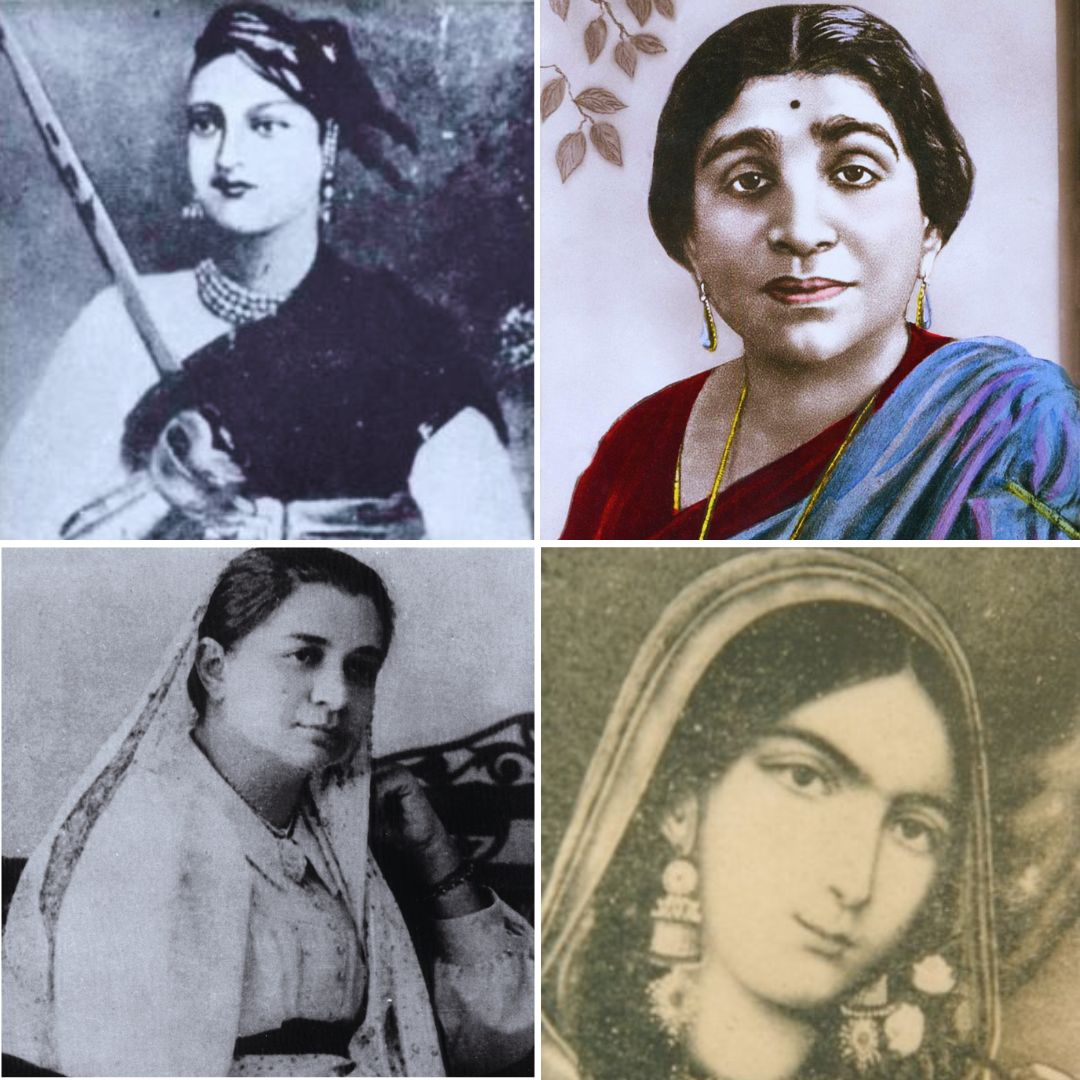On India’s Independence Day, the nation honours four brave women whose indomitable spirit and leadership radically shaped the country’s freedom struggle. Rani Lakshmi Bai, the valiant queen of Jhansi, fought fiercely against British forces during the 1857 Revolt, leading her army while defending her kingdom until her death in battle. Sarojini Naidu, celebrated as the Nightingale of India, broke new ground as the first woman president of the Indian National Congress and later as the first woman governor of Uttar Pradesh, championing women’s rights and civil liberties.
Bhikaji Cama, an exiled revolutionary, made a historic stand by unfurling an early version of the Indian flag on foreign soil in 1907, signalling India’s quest for sovereignty to the world. Begum Hazrat Mahal, the resilient wife of Nawab Wajid Ali Shah, galvanized resistance against British annexation during the upheaval of 1857 in Awadh, courageously defending her people. Government officials and historians remember these women not just as pillars of India’s freedom struggle, but as enduring symbols of courage, equality, and patriotism whose legacy continues to inspire.
Icons of Courage and Leadership
Rani Lakshmi Bai, born Manikarnika Tambe in 1828 in Varanasi, was married to the Maharaja of Jhansi and later became its queen. When the British East India Company annexed Jhansi under the controversial Doctrine of Lapse after her husband’s death, Rani Lakshmi Bai took up arms to defend her kingdom.
During the 1857 Rebellion, she courageously led her troops in combat against the British forces besieging Jhansi for weeks. Despite being heavily outnumbered, she refused to surrender, famously declaring, “Main apni Jhansi nahi doongi” (I shall not give away my Jhansi).
After Jhansi fell, she escaped on horseback with her young son and joined other rebel leaders, continuing the fight until her martyrdom in the battle of Gwalior in June 1858.
Sarojini Naidu, renowned as the Nightingale of India for her poetry and eloquent speeches, played a pivotal role both politically and socially. She was the first woman to preside over the Indian National Congress in 1925 and later became the governor of Uttar Pradesh, breaking gender barriers in Indian politics. An ardent supporter of women’s emancipation, civil rights, and national independence, her appeal and leadership inspired many to join the freedom movement and advocate for social reform.
Bhikaji Cama, often working in exile in Europe, famously unfurled the first version of an Indian flag at an international socialist conference in Stuttgart, Germany, in 1907, marking a bold assertion of Indian identity on the global stage. A fierce advocate for independence, she dedicated her life to raising awareness abroad and supporting revolutionary activities focused on ending British colonial rule.
Begum Hazrat Mahal, widow of Nawab Wajid Ali Shah of Awadh, was a fearless leader during the 1857 uprising in her region. Taking control after her husband’s exile, she organised military resistance to defend Awadh from British annexation efforts. Her leadership earned her a place as one of the earliest Indian female rulers to directly challenge colonial power. Despite eventual defeat and exile, her courage and determination remain powerful symbols of resistance and patriotism.
Officials commemorating these leaders have emphasised that their sacrifices represent the intertwined struggles for freedom and women’s rights, values that remain relevant to India’s present-day democratic ethos.
Historical Context and Continuing Impact
The Revolt of 1857, often called India’s first war of independence, was a watershed moment where women like Rani Lakshmi Bai and Begum Hazrat Mahal showcased unparalleled leadership in a predominantly male-dominated rebellion. The initial uprising was driven by discontent with British colonial policies like the Doctrine of Lapse, which deprived local rulers of their states.
Within this environment of political turmoil and mass revolt, the bravery of these women was extraordinary, inspiring many across the nation.
Decades later, leaders like Sarojini Naidu and Bhikaji Cama carried forward the legacy of resistance from the battlefield to the political and international diplomatic arenas. Naidu’s oratory skills and role in the Indian National Congress helped to galvanise public support for civil rights and women’s empowerment within the nationalistic framework. Meanwhile, Cama’s daring act of raising the Indian flag abroad publicly challenged British authority and nurtured international solidarity with India’s independence cause.
The participation of these women broadened the base of India’s freedom struggle, paving the way for wider political inclusion of women in the 20th century and beyond. Their legacy endures in India’s ongoing journey towards social justice, gender equality, and political empowerment, inspiring every generation to uphold democratic ideals and fight injustice.
The Logical Indian’s Perspective
As The Logical Indian, recognising and celebrating these women freedom fighters is crucial beyond mere historical commemoration. Their stories serve as timeless reminders that India’s freedom movement was a collective endeavour enriched by diverse voices, notably those of courageous women who defied conventions and risked everything for justice.
In an age when challenges to gender equality persist globally, honouring their legacy encourages continued efforts toward empathy, dialogue, and inclusive progress. Their lives inspire us to actively challenge discrimination and nurture harmonious coexistence within our communities.












